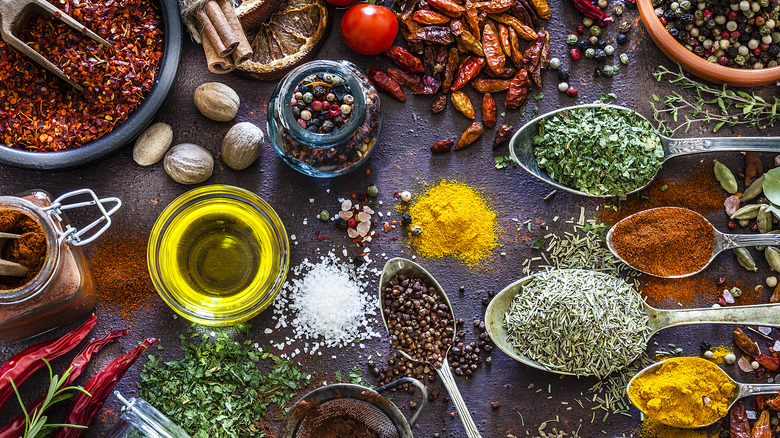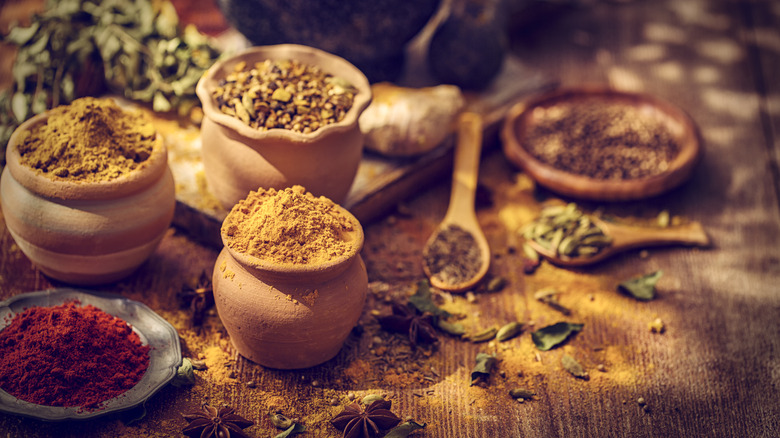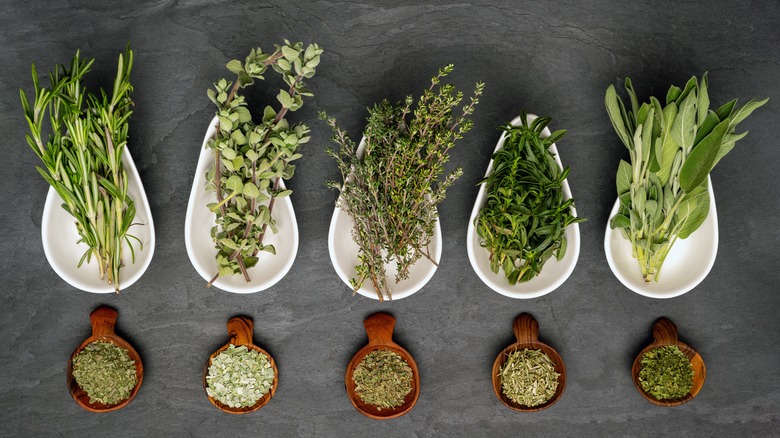What Actually Makes Spices Different From Herbs?
Spices and herbs are two important cooking ingredients that you probably have in your kitchen. It's safe to assume you know that cumin, paprika, and black pepper are all spices, and you are also aware that oregano, basil, and thyme are all herbs — but have you ever wondered about the difference between these two ingredient categories?
When it comes down to it, spices all come from various plant parts including seeds, stems, rhizomes (a type of plant stem that grows underground, like ginger), and bulbs. Herbs, on the other hand, all come from the leaves of different plants, making them a more narrow category. There are both "soft," leafy herbs like mint and "woody," tougher ones like rosemary, but make no mistake; you're still dealing with leaves in either case.
While a majority of plants will produce either a spice or an herb, there are some instances where one plant can produce both. For instance, dill, the herb, comes from the leaves of the anethum graveolens plant, while dill seed, the spice, is derived from the seeds of that plant. When you're in the kitchen, you may notice that some recipes only call for spices and others may only need herbs, but it's not uncommon to use both in your cooking. In fact, cooking with both can give you a well-rounded dish that's both fresh-tasting and perfectly spiced.
When to use herbs vs. spices in the kitchen
When it comes to herbs and spices, there are different ways that they are typically used in the kitchen. For instance, spices are considered to be stronger in flavor than herbs, as they're created by crushing and grinding robust plant parts. Because of this, they can add punchy and potent flavorings to rich stews or spiced curries. They also work beautifully to add deep and complex flavor to barbecue dry rubs, or as the star of tasty marinades. Some common spices across many cuisines include cinnamon, ginger, and cayenne pepper, while more uncommon spices that will impress your guests include star anise (a Chinese spice with a licorice-like flavor) and annatto seeds (a vivid red spice commonly used in South and Central America).
Herbs, on the other hand, tend to add a more delicate and light flavor to a dish, and don't stand up as strongly to long and hot cooking. While dried, ground versions of herbs are typically used earlier in the cooking process, using fresh herbs is common to garnish dishes, so they get a pop of color and fragrance. You will often see delicate herbs included in uncooked recipes like salads or drinks, as well as some marinades alongside spices. Take a mojo marinade, for example, where both the freshness of cilantro and the punch of cumin are necessary. While you may sometimes see spices as a garnish — like a star anise pod or cinnamon stick topping a Christmas cocktail — it's not as common as a sprinkling of fresh herbs.
Fresh vs. dried herbs and spices
There are lots of differences between fresh and dried herbs and spices, but they each have their place. Ground spices are more flavorful than fresh ones, which is why many recipes using fresh versions call for them to be sauteed or toasted first, since heat also affects the flavor release of spices. Some spices are popularly used both fresh and dried. When using fresh ginger instead of ground, you'll get a more punchy and sweet flavor. Baking tends to call for ground ginger, as it brings warmth and spiciness to a recipe, while fresh ginger wakes up stir-fries and soups. Similarly, fresh turmeric has many health benefits, so it's often used in drinks, while ground turmeric is used in curries, rice dishes, and more.
When it comes to herbs, you can find fresh versions in your supermarket's produce section, while dried herbs are usually in the spice aisle. Dried ones tend to have a deeper flavor, while fresh herbs bring their distinctive scent and delicate taste to a dish. Dried herbs can begin to lose their flavor after six months, although rubbing them between your fingers can release their oils and perk them up. Fresh herbs can go bad after about a week, but can last longer if you avoid herb storage mistakes.
Similarly to spices, sometimes using a fresh herb is crucial to a dish. For instance, many Italian dishes call for fresh basil, and using dried won't deliver the same flavor — especially because dried basil can taste more similar to mint.



